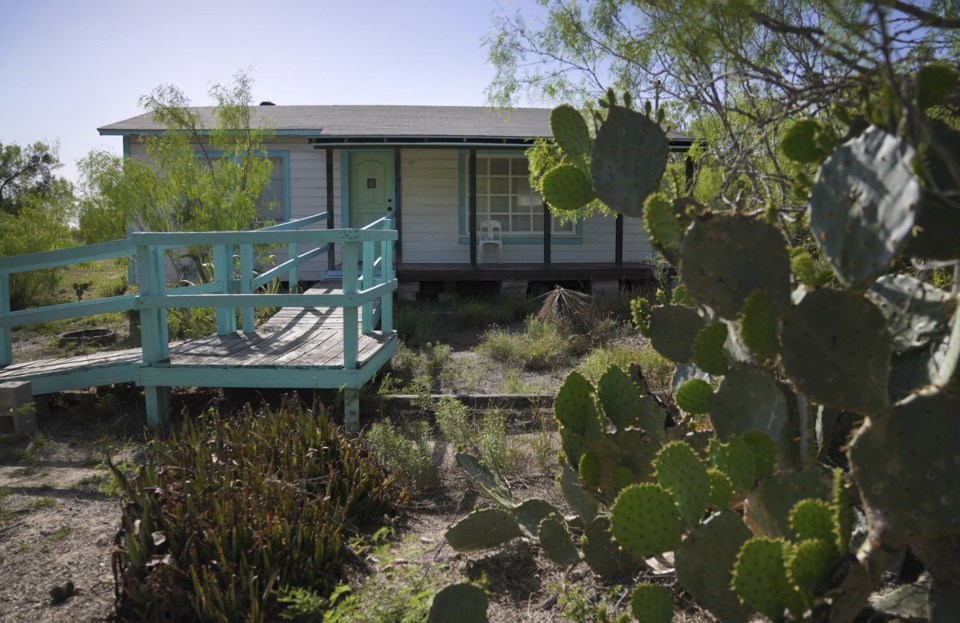MIRANDO CITY, Texas (AP) — The late Amada Cardenas was called many things — the “angel of peyote,” the “peyote rose” or simply “Grandma Amada.”
The beloved Mexican American peyotera — who was the first authorized dealer of peyote in the United States — not only played a vital role in the history of the peyote trade, but was also revered as an elder and healer by .
Her home still stands in the heart of Mirando City, a tiny South Texas border town 30 miles east of Laredo with a population under 200, as a shrine and museum that holds her legacy. It's in an area Native Americans call the peyote gardens because the spineless cactus containing the hallucinogen mescaline, a plant they hold sacred, only grows naturally in this region and in northern Mexico.
Cardenas, a native of this land who grew up in a community where Catholicism was the way of life, learned the peyote trade at an early age from her father. She and her husband, Claudio Cardenas Sr., were the first federally licensed peyote dealers who harvested and sold the sacramental plant to members in the 1930s. After her husband’s death in 1967, she continued to welcome generations of church members to her home until her death in 2005, just before her 101st birthday.
Her biographer and peyote researcher, anthropologist Stacy B. Schaefer, wrote that the Cardenases got into legal hot water with state and federal government officials over how peyote laws were interpreted and implemented for most of the 20th century. Schaefer says they stood strong in their support of Native Americans’ rights to acquire and use peyote in religious ceremonies, risking prosecution and incarceration for doing so.
In 1957, Claudio and Amada Cardenas were appointed Texas delegates-at-large for the Native American Church of North America. In 1987, Amada Cardenas was appointed as an officer of the Native American Church of the United States.
Her home's living room, which has welcomed thousands of guests over decades, is now filled with framed family photos and gifts from the peyote people she hosted. The dressers in the bedroom hold hundreds of handwritten letters from Native people asking for her prayers, blessings or thanking her for having them over for a harvest or ceremony.
Cristala Allen, who is Caddo and visited Cardenas often in the 1990s, said Cardenas had a holy presence.
“The love was palpable every time I visited,” she said. “She lived in a humble little house. But she welcomed everyone. Tibetan monks have been out to visit her. It’s a vibration. When you go to that land, you can feel it.”
Allen said Cardenas is “the matriarch of the Native American Church.”
“Amada was living where the medicine grows and thrives,” she said. “She’s cutting medicine, squeezing the peyote juice and it goes into your body and bloodstream. It’s like she became the embodiment of it."
Sandor Iron Rope, an Oglala Lakota spiritual leader and president of the Native American Church of South Dakota, said Cardenas was a living representation of the words “love, faith, hope and charity,” written like mantras in her home. They are some of the core values of the church.
“She wanted everybody to get along and for Native people to have access to peyote,” he said. “She wanted to bring peyote back to our people, for healing."
Sky Groove, who takes care of the property, said he became familiar with the area in the 1990s and met Cardenas from whom he learned some of the Spanish peyote songs she sang during ceremonies. He remembers and sings this one: “Manana, manana, venga la manana,” which means “the morning comes.”
“She was a very deep person,” said Groove, who is not Native American, but has been associated with the Native American Church for decades. “She lived around the medicine all her life. There is a certain amount of magic in the medicine that is impossible to describe. They say it’s the peyote spirit. Amada knew it was there.”
___
Associated Press religion coverage receives support through the AP’s with The Conversation US, with funding from Lilly Endowment Inc. The AP is solely responsible for this content.
Deepa Bharath And Jessie Wardarski, The Associated Press




